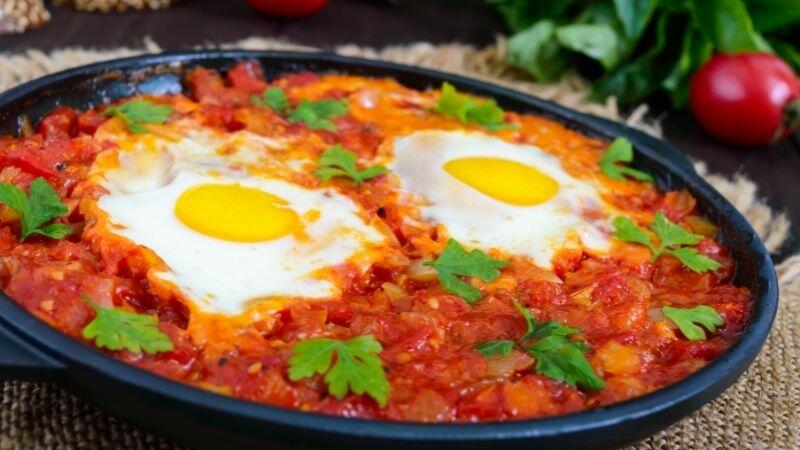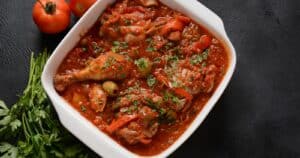Two of the most-loved Arabian dishes, Mandi and Manakeesh, are also some of the mildest dishes in the world in terms of
Here are 6 spicy Middle Eastern food dishes to try for your next meal:
- Shakshouka – Poached eggs in spicy-laden tomato sauce
- Chakhchoukha – Crispy bread crumbs saturated in a homemade stew
- Kebab – Minced meat marinated and made into long patties
- Matbucha – A thick tomato soup featuring a pepper salad
- Shawarma – A doner kebab sandwich
- Arabian Broast – Arabic version of southern fried chicken
In this article, you will learn more about the Middle Eastern dishes you must try as a spicy food lover. Moreover, you’ll discover what makes them spicy, so you can be sure which one of the following you want to try first!
1. Shakshouka
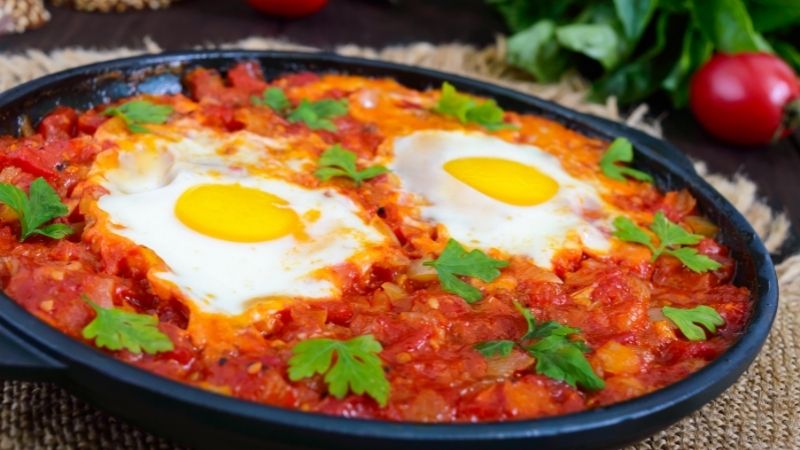
This poached-egg dish involves dunking poached eggs in a homemade tomato sauce featuring Arabian spices. Because Arabian spices are milder, the spicy version swaps the baharat
Since there is a larger Indian ex-pat population in Arab countries, the chili mix used to make spicy shakshouka is usually Indian. Even without the
2. Chakhchoukha
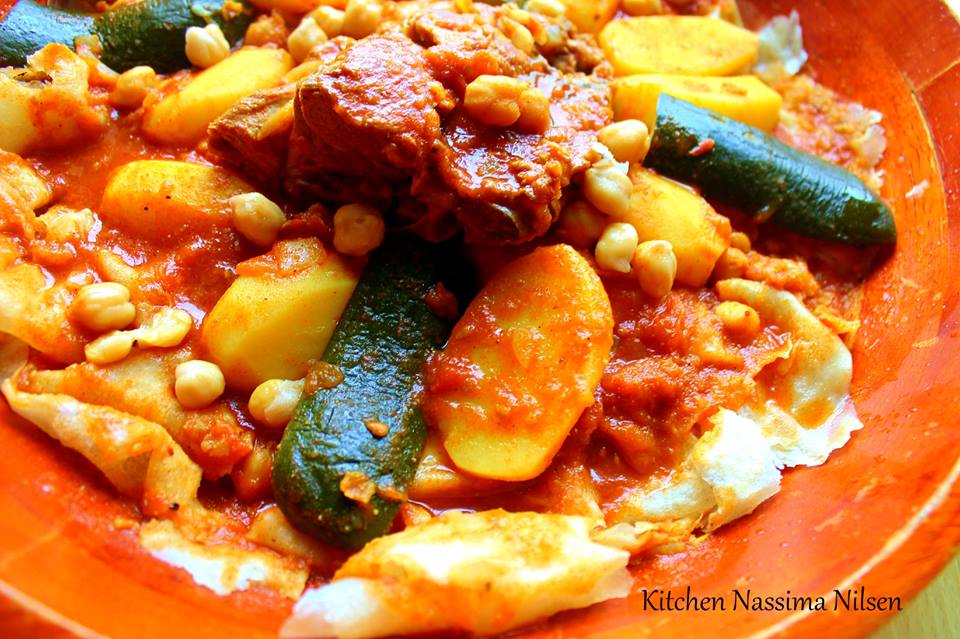
Because of its proximity of pronunciation with Shakshouka, Chakhchoukha can be overlooked. It is an entirely different dish that features think crispy bread broken into a stew.
As with most Middle Eastern dishes, where there is a stew, there is room for spiciness. While traditional Algerian Chakhchoukha is not as spicy as even mild Mexican food, one can request the spicy version, which contains hotter spices.
From cutting green chili into the stew to using a ground red pepper, Arab cooks use different methods to boost the
This dish can be easily ordered with a higher Picante heat because it is a festive dish that tourists get introduced to at different gatherings. A spicy version soon follows when an Arab plate gets exposed to a larger non-Arab audience.
3. Kebab
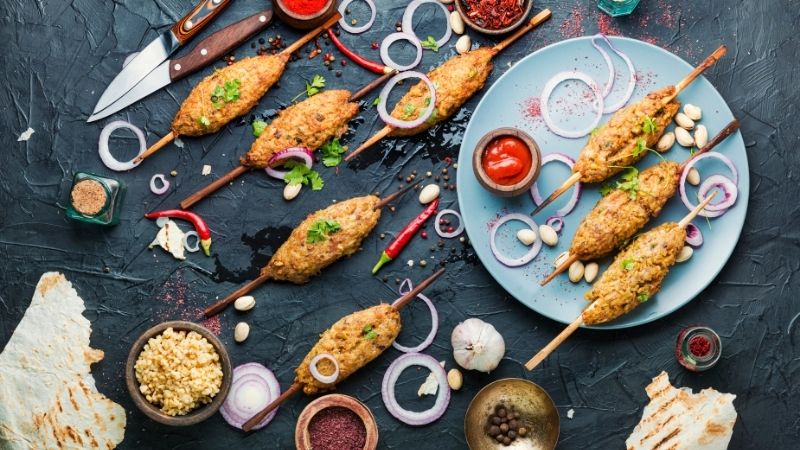
Kebabs have transcended the Middle East and have become a global delicacy. From Britain to Afghanistan, there are many variations of kebabs, including:
- Sheesh Kebab – This is the classic kebab that features mince meat horizontally stuck around a long skewer to form a sausage-like meat patty.
- Gola Kebab – This is the round version of kebab that is spicier because of its prominence in India. This is a non-middle-easter spin-off.
- Shaami Kebab – A Pakistani version of kebab that features pulled chicken and ground peas stuck together with egg yolk. This isn’t considered a middle-eastern variant.
- Moroccan Chebab – Moroccan version of sheesh kebab with different marinade. This variety counts as a middle-eastern one.
- Doner Kebab – A vertical tower of boneless meat that rotates in front of a heat source and is used to chop off chunks and serve in pita bread. While popularized in Greece, a version of doner kebab remains a Middle Eastern food. Read more about it in the shawarma section.
Each version of kebabs has a spicier variation thanks to the mainstream appeal of kebabs. Because of the influx of tourists in globalized Arabian countries like the UAE and Qatar, kebabs have an audience beyond the mild-spice-loving Arabs. Most Arab restaurants offer a hot and spicy version of sheesh kebabs.
4. Matbucha
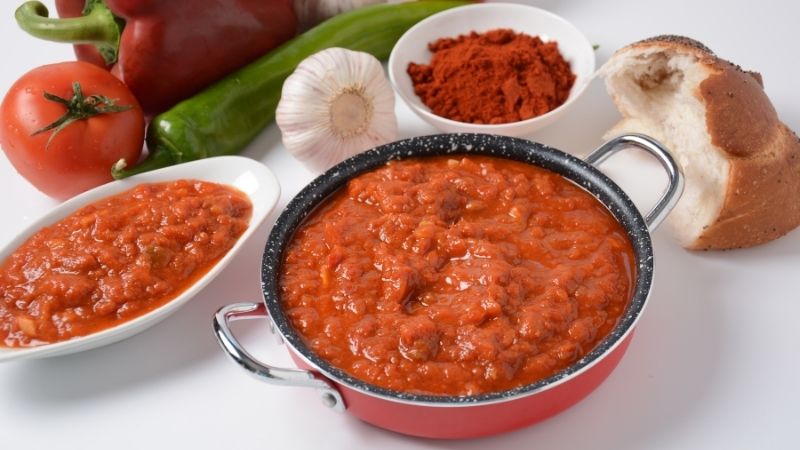
Matbucha is a marinated salad made by slow-cooking tomatoes alongside roasted bell peppers, garlic, and chilies. Depending on the ingredients used, Matbucha can be pretty spicy.
You can add the following to ensure that it isn’t as mild as the average Arabian dish:
- Green chili – Not usually added to Matbucha but can be used to increase the heat of the overall dish.
- Red chili – Is sometimes added in Matbucha. One can add more of it to make the resulting dish spicier.
- Chilli powder – Very risky to add, but a pinch of powdered red pepper can help raise the heat of the final dish.
5. Shawarma
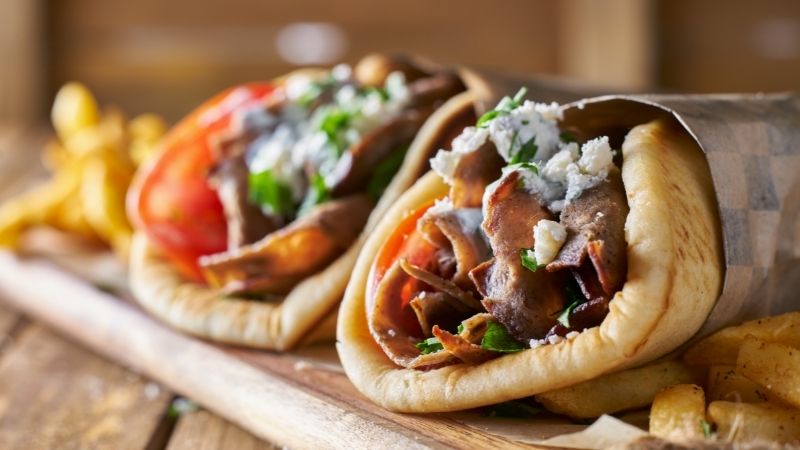
If you have visited Greece, you might have come across a version of the Shawarma. In Greek cuisine, Doner is the term used to describe a rotating tower made from a rotating amalgamation of boneless meat or thick mince.
When meat chunks are chopped off a doner and wrapped in pita bread, it is called a gyro. Both the Doner and the gyro are called Shawarma in the Middle Eastern version.
Shawarma is slightly spicier than the average doner gyro. More importantly, you can order an even spicier version of the Shawarma by asking for a “mexiki” shawarma. While there is no Mexican spin-off of Shawarma or Doner, Middle Eastern restaurants have somehow decided that adding spices to Shawarma makes it Mexican. This is probably because of the association of Latin food with spiciness.
Mexiki shawarma, or Mexican Shawarma, remains a Middle Eastern invention despite its name and is available in almost all Arabian fast-food restaurants in the united Arab emirates, Saudi Arabia, and Qatar. It is also available in Kuwait and other Arab countries.
6. Arabian Broast
When the KFC franchise had not expanded enough globally to reach Saudi Arabia, Shakkour AbuGhazalah took the opportunity to make the Saudi answer to KFC. He founded Al Baik in 1974, and its secret recipe, alongside a lack of disclosure mandates, developed his restaurant franchise a cult following.
A google image search of the term “Al Baik Customers” will show you the craze surrounding this relatively new addition to Middle Eastern cuisine. Despite KFC opening its doors in the USA, a majority of Al Baik’s customers remain loyal mainly because the recipes are different.
Al Baik is significantly spicier, with visible hints of garlic and red pepper. It has inspired a movement where many fast-food restaurants in Middle Eastern countries offer “spicy broast,” which is the Arabic version of southern fried chicken.
Recap: Spicy Middle Eastern Food to Try
Middle Eastern food is mild yet flavorful. But before dismissing it because of your love for spicy food, you must note that every Middle Eastern dish that gains global popularity also spawns a spicy variation.
Spicy Middle Eastern food items to try include shakshouka, Chakhchoukha, Kebab, Matbucha, Shawarma, and Arabian Broast. While their standard versions might not be very hot, their spicy variations are available on request from most Middle Eastern restaurants.

